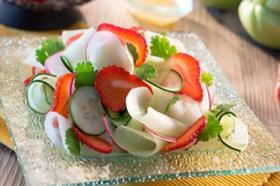
Costa Rica has announced the formation of the Chayote Export Group to consolidate and support worldwide exports of quality chayote.
Chayote is a member of the cucurbitaceous family originating in Mexico. The light green, pear shaped vegetable is also known as christophine, cho-cho and vegetable pear.
According to Pedro Beirute, CEO of trade promotion agency Procomer, the new group will consolidate volumes and will be held to strict standards of transparency, quality, open and honest communication, and cooperation.
All producers in the group must also meet specific certifications includingGlobalGAP, ISSO and other licenses, as well as high packaging standards. The group consists of 11 farmsrepresenting 265ha of production.
“Our intention is twofold,” said Beirute. “One, it is to create an effective support structure for our producers and exporters that will allow them to continue to amply provide the world’s highest quality chayote to our markets. Second, it will provide a more efficient platform for our customers to get what they need in terms of quality, packaging, innovation and marketing.”
In 2016, Costa Rica exported almost 30,000 tonnes of chayote with a value of US$14.3m worldwide, of which nearly 22,000 tonnes went to the US.
“Costa Rica is recognised for its high quality chayote, noted by the uniform and optimum colour and form of the product,” said Beirute.
“The creation of this group of growers and exporters allows us even greater control over quality standards, to assist the companies with support and certifications and to provide marketing and promotional support to our customers.”
Costa Rica enjoys a strong reputation with chayote among its US customers.
“We have been bringing in Chayote from Costa Rica for over a decade now and the quality has always been exceptional,” said Anthony Serafino of New Jersey-based EXP Group.
Jose Flores of Philadelphia importer John Vena, said Costa Rica stands out for the quality and consistency of its chayote.
“We handle it almost exclusively over other growing regions,” he said. “Our customers prefer Costa Rican product – and we’re happy to handle it.”
The group is backed by the numerous marketing efforts of the “Essential Costa Rica” initiative including branding, country-of-origin marking, website, and other promotional support.
“We believe chayote has a huge potential with consumers, especially in the area of health and wellness,” said Beirute. “It’s a very versatile item and can be consumed cooked or raw, sweet or salty.
“It hasvitamin C and antioxidants, and is high in fibre and low in calories. It’s ideal for the control of glucose and liquid retention. These are all very promotable attributes in today’s marketplace.”
Beirute believes Costa Rica is perfectly positioned for this next step to open up the chayote market.






No comments yet